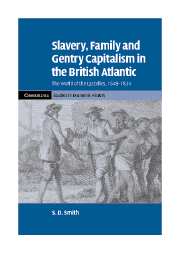 Slavery, Family, and Gentry Capitalism in the British Atlantic
Slavery, Family, and Gentry Capitalism in the British Atlantic Published online by Cambridge University Press: 17 July 2009
During the eighteenth century, spectacular fortunes were gained and lost in the West Indian colonial trades. European powers, chiefly Britain and France, competed for control of Caribbean islands and shipping routes in a series of naval conflicts. And more than six million Africans were forcibly transported across the Atlantic to be sold into plantation slavery. This book examines commercial success and failure in the British transatlantic nexus by analysing the activities of the Yorkshire-based Lascelles family and their associates over three centuries. It is thus a micro-history, in which Henry Lascelles emerges as a paragon of success, while his business partner Gedney Clarke exemplifies a certain type of failure. The rationale underpinning this volume is that detailed analysis of these and other case studies enriches understanding of the processes shaping the course of history.
In the pages that follow, hypotheses or conjectures regarding these historical processes are advanced based on surviving sources documenting the activities of the Lascelles. Some of these conjectures are related to previous research; others are more original in the sense that they emphasise aspects of the past that feature less prominently in existing accounts. The first of the hypotheses argues that a new framework for business association was established by mercantile communities based in London, Barbados, and North America between the later seventeenth and early eighteenth centuries. The second thesis argues that a key element of this framework lay in control of complex credit networks, crucial for the success (or failure) of Atlantic commercial ventures.
To save this book to your Kindle, first ensure [email protected] is added to your Approved Personal Document E-mail List under your Personal Document Settings on the Manage Your Content and Devices page of your Amazon account. Then enter the ‘name’ part of your Kindle email address below. Find out more about saving to your Kindle.
Note you can select to save to either the @free.kindle.com or @kindle.com variations. ‘@free.kindle.com’ emails are free but can only be saved to your device when it is connected to wi-fi. ‘@kindle.com’ emails can be delivered even when you are not connected to wi-fi, but note that service fees apply.
Find out more about the Kindle Personal Document Service.
To save content items to your account, please confirm that you agree to abide by our usage policies. If this is the first time you use this feature, you will be asked to authorise Cambridge Core to connect with your account. Find out more about saving content to Dropbox.
To save content items to your account, please confirm that you agree to abide by our usage policies. If this is the first time you use this feature, you will be asked to authorise Cambridge Core to connect with your account. Find out more about saving content to Google Drive.